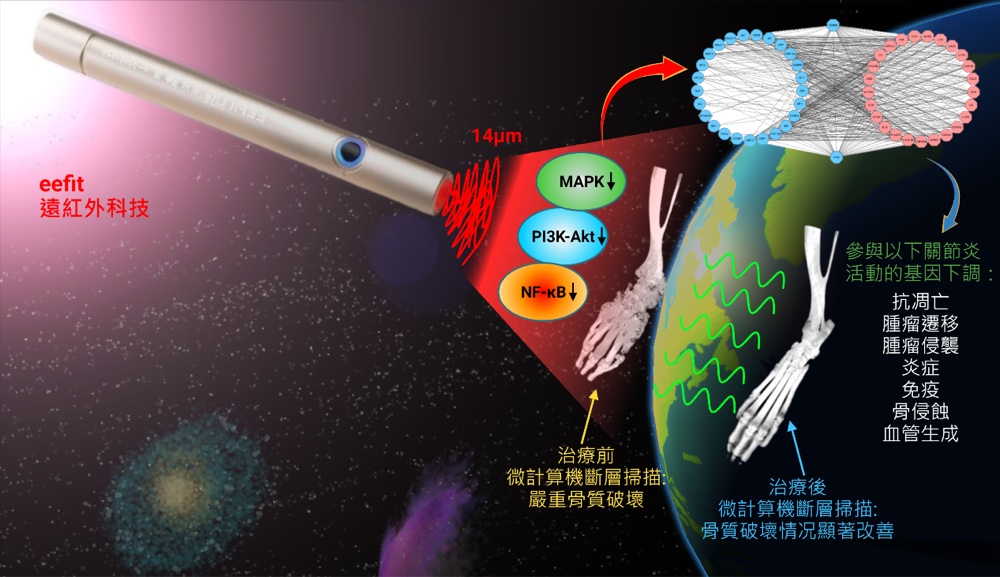Rheumatoid arthritis (RA) is a common chronic autoimmune disease with a prevalence rate of ~0.36% in China. The pathogenesis of RA involves dysfunctional immune cell that cause cartilage and bone damage in joints, resulting in functional disability. RA has long been a serious threat to human health, daily life and substantial economic burden to society and families. RA patients therefore urgently need an adjuvant therapy to alleviate the clinical symptoms for improving the quality of life, and reducing the possible financial burden to their families.

Far-infrared irradiation (FIR) is an essential component of sunlight and provides a large amount of energy for life on Earth. FIR can transfer energy between objects through thermal radiation, penetrate solid, radiate power and can be easily absorbed and converted into energy by the human body. Currently, many existing FIR related products work by altering mainly the local tissue temperature of patients through thermal radiation to promote blood circulation, thereby relieving the clinical symptoms of different diseases. However, there is still a lack of scientific and systematic research on the therapeutic effects of the FIR or its products on RA. Recently, Dr. Vincent Kam-Wai Wong and Dr. Betty Yuen-Kwan (co-corresponding authors), the associate professors from the Dr. Neher’s Biophysics Laboratory for Innovative Drug Discovery (State Key Laboratory of Quality Research in Chinese Medicine, Macau University of Science and Technology), and the PhD student Chen Xi (1st author) discovered that the eefit FIR technology emits FIR of specific wavelength that can significantly improve arthritis symptoms in rats with adjuvant arthritis (AIA) without altering the tissue temperature. The research team further revealed the molecular mechanism of FIR in RA therapy and confirmed that eefit FIR technology can alleviate the inflammatory response and symptoms of AIA rats by inhibiting the activation of mitogen-activated protein kinase (MAPK), phosphatidylinositol 3-kinase/protein kinase (PI3K/Akt), and nuclear transcription factor-κB (NF-κB) signaling pathways, which in turn suppress the expression of numerous inflammatory and autoimmune genes regulated by several important transcription factors, such as nuclear transcription factor-activating protein-1 (AP-1) and CAAT region/enhancer-binding protein (C/EBP). Notably, physical therapy based on eefit FIR technology is a non-pharmacological and non-surgical adjunct to the classical treatment of RA with low treatment cost, no body temperature sensation or obvious side effects.
Research on eefit FIR therapy and its mechanisms of action has therefore opened up new avenues for treatment of RA with promising therapeutic applications. The research is recently published in the Journal of Advanced Research (Impact Factor IF: 10.479; https://doi.org/10.1016/j.jare.2021.08.015), an internationally recognized multi-discipline journal. The research was funded by the Science and Technology Development Fund of the Macao Special Administrative Region (Project Title: Establishment of Dr. Neher’s Biophysics Laboratory for Innovative Drug Discovery; Project No. 001/2020/ALC).





